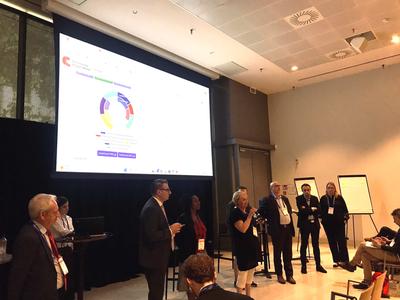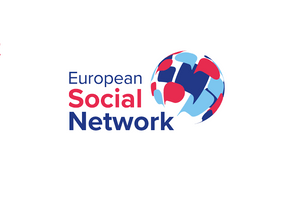HOME | CASE STUDIES | HOW TO USE THE WHEEL | PRICING | SUPPORT
Case Study: European Social Network
Mission and strategic aims
ESN’s mission is to inspire social services leaders to empower and improve the lives of people in the community, and to foster an involved, innovative environment where research and practice involves not just the professionals, but also social service practitioners, service users, and carers in the co-creation and co-production of the services of the future.
At the heart of ESN’s values are
- the respect for the dignity of people using social services: children, families and youth, people with disabilities and mental health problems, homeless people, and older people with care needs;
- preservation of people’s independence for as long as possible;
- pursuit of innovation and evidence-based social work and care practice;
- promotion of equality and non-discrimination as service providers and employers;
- promotion of people’s right to accessible, quality, affordable social services; and
- partnership with health, employment, education, housing and other relevant sectors.
Led by CEO Alfonso Lara-Montero, ESN’s vision is to be a challenging advocate for person-centred, inclusive services, a growing network with a unique membership responsible for the public management of social services, a hub for learning and exchange on innovative and evidence-based practice, a platform to strengthen synergies between practice, policy and research, and a well-informed and progressive voice on challenges affecting social services and promoting economic and social wellbeing.
Shared challenges, shared opportunities
As a leader in the discourse around social services and policies, ESN is in a unique position to observe, identify and address the challenges in the European social services landscape which its member organisations navigate with increasing urgency. ESN’s Chair and Deputy Director of the city of Bruges (Belgium), Christian Fillet, is passionate about the association’s role in shaping the social services of tomorrow: “The future is not something that happens to us, it is something we create together. True progress can be only achieved through collaboration.”
As a membership association, ESN’s goal is to leverage the power of collaboration, and to find even better ways of engaging with a diverse membership base of organisations across Europe, leveraging digital choices that promote inclusion and engagement.
ESN’s Senior Membership and Operations Officer Tanja Sheikhi recognises both the challenges and opportunities ESN shares with its member organisations: “Our work at ESN revolves around our community, and the work we do to promote collaboration and co-creation for a better future for all. For us at the Secretariat, and for ESN’s Board, it’s about engaging with our community, giving an equal voice and a sense of agency to all of our members, and increasing the levels of transparency and accountability between ESN’s leadership and our members.”
“Community, collaboration and co-creation are also at the heart of all of our members’ work in all corners of Europe, and it is these synergies that help us consolidate the ESN’s aims and objectives with those of our member organisations. For us, digital inclusion and community engagement begins at home.”
Co-creation at the European Social Services Conference
The European Social Services Conference (ESSC) is ESN’s annual flagship event, Europe’s largest policy and practice forum for social services, and an opportunity for decision-makers in public authorities, third sector organisations, social services professionals, providers of technology solutions, and researchers to share and exchange their knowledge and experiences with peers from across Europe and other regions of the world.
In June 2024, #ESSC2024 brought together 681 delegates from 39 countries to Antwerp, Belgium, to discuss how to co-create community-based social services, cities of social inclusion, responses to manage the future workforce, and digital solutions for social inclusion.

In the challenging landscape faced by its member organisations, for ESN, a critical piece of co-creation is to strengthen the voice of its community and to identify the most important and impactful themes to focus on.
ESN chose the Community Impact Wheel for its capacity to open up new ways of engaging with its community, and to make visible the potential of co-creation through smart digital solutions. At the ESSC2024 Members’ Meeting, the Community Impact Wheel was used to gauge the views, values and priorities of the ESN community on the themes and topics that make a difference. “With the Community Impact Wheel, we found a new, engaging way to spark a dialogue, and to open up new layers of communication between the members of our community, and its leadership,” says ESN’s Membership and Operations Officer Timothy Brohée.
The results of the Community Impact Wheel survey and insights from the conversation sparked by the exercise will feed into ESN’s policy work which continues in the Members Forum in spring 2025, ahead of the next four-year programme period, co-funded by the European Commission and led by ESN’s CEO Lara-Montero and Senior Policy Officer Martin Lichte.
For ESN, collaborative digital tools such as the Community Impact Wheel foster a deeper sense of belonging and of agency with the members of the community, and allow the members of the community to challenge, question and hold the leadership to account through increased transparency. These key values at play not just in ESN’s work as a powerful membership and lobbying organisation, but also in their relevance to the work their members do in their communities in the social services sector.
These themes were echoed throughout the ESSC2024 Conference, from the keynote address of Nathalie Berger, Director for Support For Member State Reforms at the European Commission to the Transition Collective’s Christian Bason’s views on the future of co-creation at a service, organisation and systems level with empathy and sense of belonging at the core, and Nurture Development’s Cormac Russell’s insights into new models of social wellbeing focusing on enabling communities and institutions to co-create and co-produce a future which values everyone and recognises them as valuable.

